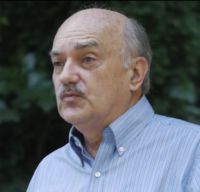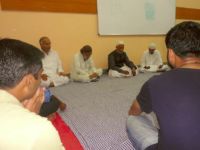Common elements draw Christians and Muslims to fellowship
When Muslims greet others, they say: ‘As sallamu aleikum‘. Their greeting is a beautiful prayer. They wish in their greeting ‘May you come ever more fully and completely into the state of Islam by submitting your will to God (Qur’an 33:44). A Christian offers to all whom he meets Peace of Christ, because Christ is our peace (Eph. 2:14). These greetings indicate something common: God and God’s will for humanity, albeit they both recognize God and His will in different ways. What they recognize in common draw them to fellowship (NA 1).
It is important for us to note that Nostra Aetate inaugurates a new era for Christian Muslim relations. It affirms: “The Church regards with esteem … the Muslims”. This is a unique statement and an absolutely a new beginning. The document explains the reason for ‘esteem’: “They (the Muslims) adore the one God, living and subsisting in Himself; merciful and all- powerful, the Creator of heaven and earth, who has spoken to men…” Faith in God and adoration of One God is central to Islam. Muslim faith does not relate to a God who is invented by human reason, but God has made Himself known to the Muslims community through His word. It is also for Christianity, though this One God’s nature is revealed as Triune in Christ for Christians. Differences are important and clarity on such fundamental divergences should not be glossed over. They need to be recognized, affirmed and respected. This faith affirmation urges us to know one another and promote mutual understanding between Christians and Muslims.
The document continues to note that Muslims and Christian are children of Abraham in Faith: “… they take pains to submit wholeheartedly to even His inscrutable decrees, just as Abraham, with whom the faith of Islam takes pleasure in linking itself, submitted to God. Though they do not acknowledge Jesus as God, they revere Him as a prophet. They also honour Mary, His virgin Mother; at times they even call on her with devotion. In addition, they await the Day of Judgment when God will render their deserts to all those who have been raised up from the dead. Finally, they value the moral life and worship God especially through prayer, almsgiving and fasting”.
Pope Francis in his Apostolic Exhortation Evengelii Gaudium reaffirms this teaching of Nostra Aetate in the following words. He writes: “Our relationship with the followers of Islam has taken on great importance, since they are now significantly present in many traditionally Christian countries, where they can freely worship and become fully a part of society. We must never forget that they “profess to hold the faith of Abraham, and together with us they adore the one, merciful God, who will judge humanity on the last day”. The sacred writings of Islam have retained some Christian teachings; Jesus and Mary receive profound veneration and it is admirable to see how Muslims both young and old, men and women, make time for daily prayer and faithfully take part in religious services. Many of them also have a deep conviction that their life, in its entirety, is from God and for God. They also acknowledge the need to respond to God with an ethical commitment and with mercy towards those most in need (252)”.
We notice that Muslims’ submission to the will of God is specially noted and praised. This is certainly a theological common ground between Christian and Muslims. Finding the will of God and submitting one’s will to God’s will is at the heart of every Christian’s way of life. On this common ground the document places the fundamental differences and other common elements of beliefs between us, Christians and Muslims. This presentation indicates the importance of knowing exactly where we converge and where we differ. Pope Francis reminds us: “In order to sustain dialogue with Islam, suitable training is essential for all involved, not only so that they can be solidly and joyfully grounded in their own identity, but so that they can also acknowledge the values of others, appreciate the concerns underlying their demands and shed light on shared beliefs” (EG 253).
Finally, Nostra Aetate acknowledges the wounded past and call for social healing. NA exhorts: “Since in the course of centuries not a few quarrels and hostilities have arisen between Christians and Moslems, this sacred synod urges all to forget the past and to work sincerely for mutual understanding and to preserve as well as to promote together for the benefit of all mankind social justice and moral welfare, as well as peace and freedom”.
Dear friends: the teachings of the Catholic Church with regard to promoting relations with Muslims are open-ended and deeply respectful. It is important to place these teachings in the larger context of India and her diversity of religions, cultures, languages, and traditions. Christians and Muslims live in this sub-continent, India for centuries. Both sets of believers have made a huge contribution to this vast land.
Intolerance is one of the worst forms of violence
Our mutual understanding should lead us to strive for greater interaction between all peoples. It is all the more important when tensions between faith communities surface and wipe out centuries old relationships. The reports we receive with regard to growing incidents of intolerance among people of different religions in this vast nation is a cause for worry for us. Misunderstanding of one another’s faith traditions combined with the unhealed wounds of the past contribute to intolerance inspired violence. Moreover, dragging religion into politics poisons and wipes away the prevailing good will among communities and cultivates fanaticism. What is the responsibility of people who strive to submit to the will of God? I certainly feel that it is the moral and ethical responsibility of both Christians and Muslims to work for peace along with all people of good will from among other religions and traditions.
India a Salad bowl
It is important that we should appreciate diversity that marks this nation. One could liken India to a Salad bowl. Variety of green leaves and sprouts make the salad attractive and nourishing. Similarly diversity marks India’s uniqueness and enhances her beauty. I believe without an iota of doubt that diversity is clearly a part of God’s design and purpose for our universe and for us humans. India has the unique distinction of having had the experience of diversity of cultures and religions for several thousand years. It has led to opening many new doors and creating many opportunities for new and beautiful ways of integration and mutual enrichment. India is a mini world, God’s beautiful world. Human selfishness has often given rise to conflicts and confrontations. Consequently, we have created an ugly and painful world and people.
We need to ask ourselves who will contribute to recreate God’s beautiful world? We feel that it is we humans who have the endowments given to us to create a new world, a new people. We have the awareness to know and understand where we are. We have also the power to choose. We can make wise and appropriate decisions that will make a difference to today’s world conditions and replace it with a new climate and relationships. We realize that it is not an easy goal to achieve, but it is possible if we multiply our human capital, increase our social capital and create networks and bonding and thus evolve a new way of being human.
Freedom of religion an unconditional right of persons
It is absolutely important to affirm the freedom of conscience and right to religious freedom as an unconditional right of person. This demands recognition of the practice of one’s faith both in the cave of one’s heart as well as publically. Since all people have the obligation to seek, acknowledge and uphold truth, such commitment requires the freedom to follow a particular religion or no religion. Any compromise with this right would damage the dignity of person. In order to protect and strengthen this freedom people of good will from all sections of the society need to gather their acts together.
Working on common projects
Christians and Muslims need to work on projects for environmental protection. A peaceful world is impossible with a life style that destroys and depletes natural resources. Both Christians and Muslims believe that God created this world and appointed us as stewards of creation. We are called to tend this world and care for the world gently. One cannot close one’s eye to the way in which rich and powerful destroy this God given world. Such ‘silence’ endangers our commitment as Christians and Muslims. It is high time Christians, Muslims and others join hands together will people of other faiths are work towards great justice to earth and her resources.
Care for the poor
Large sections of humanity live in inhuman conditions because of poverty, unplanned urbanisation. It is hugely complex task to access, analyse the present day economic policies and articulate a clear opinion in favour of the poor. Muslims and Christians should not hesitate to take up this huge task of shaping policy decisions on behalf of the poor. Pope Francis visualised that the Church as a field hospital. He meant that Christians should attend to all who are wounded. Poor are wounded by the unfair economic practices of the world. Caring for them and working with them on works to alleviate conditions that impoverish people. Christians will appreciate all who would like to work with them or invite them to work with others in poverty eradication programs.
Finally we emphasise that Christians and Muslims should recognise, although their faith traditions differ on many crucial areas, they are sufficiently solid theological common ground between them to come together to promote better understanding between them and to work together for peace and prosperity of this great nation. I also put emphasis on the need of these two groups of believers to work with all people of good will in common projects.



Leave A Comment
You must be logged in to post a comment.